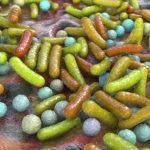By David Blyweiss, Advanced Natural Wellness
When you think of sugar you probably think of sugar cane, or maybe beets. But a field of corn—probably not. But most of the sugar in the foods we eat and the beverages we drink today comes from corn. In fact, you can find high fructose corn syrup (HFCS) in jelly, juice, sodas, whole-grain breads, cereals, ketchup, crackers, yogurt, sweet pickles, applesauce, salad dressing, ice cream, cough syrup and lots more. And that’s not a good thing.
Proponents of HFCS say its natural, but “natural” is a relative term. Corn syrup is a glucose-heavy syrup made from corn starch. There’s no fructose in corn syrup—not naturally, at least. But in 1957, researchers discovered an enzyme that could turn the glucose in corn syrup into fructose. This process was modified and improved upon in the 1970s, making it possible to mass-produce HFCS.
Open your arteries, improve blood flow for a new health miracle...
Did you know your circulatory system has over 60,000 miles of arteries, veins and other blood vessels, if stretched end to end?
But as you age, your blood vessels undergo changes, which may cause them to stiffen, thicken and get clogged.
GOOD NEWS! Doctors have now identified a “Miracle Molecule” inside your arteries that helps OPEN your arteries and IMPROVE blood flow.
It’s what Dr. Valentin Fuster calls it, "One of the most important discoveries in the history of cardiovascular medicine."To you, that means...
- Healthy blood pressure
- Sharper mind and memory
- Skyrocketing energy and muscular strength
- Increased pleasure and passion in the bedroom
- Improved circulation to every cell and organ in your body
Go here to discover a new natural way to significantly boost the levels of this miracle molecule in YOUR body NOW!
The entire process involves several steps and three different enzymes, but eventually a syrup with around 90 percent fructose content is created, and this is blended down with untreated syrup (containing only glucose) into a mix of either 42 percent or 55 percent fructose. The rest is glucose. It’s also important to know that two of the enzymes used, alpha-amylase and glucose-isomerase, are genetically modified to make them more stable.
Are You Suffering From...
- Love handles and a pot belly
- Romance that isn't what it used to
- Forgetfulness and inattention
- Low (or no) strength and endurance
- A sex drive that's shifted into neutral...or worse
If so...you may have Mature Male Burnout. Click here to discover more about this unique condition and what you can do about it.
I don’t know about you, but none of this sounds particularly natural to me.
And then there is HFCS’s impact on health. A groundbreaking study in the Journal of Clinical Investigation recentlylinked HFCS to obesity. The researchers recruited volunteers to drink a glass of Kool-Aid with every meal for 10 weeks; half took their soft drinks sweetened with fructose, the other half with glucose. By the end of the study, both groups had put on weight, but the subjects getting fructose had more visceral fat—the kind that surrounds our organs and is associated with a heightened risk for atherosclerosis, cardiovascular disease and type 2 diabetes. The fructose group also showed higher levels of LDL cholesterol and lower insulin sensitivity.
But wait—there’s more. A diet high in fructose also increases the risk of developing high blood pressure (hypertension), according to a paper presented at the American Society of Nephrology’s 42nd Annual Meeting and Scientific Exposition in San Diego, California. The findings suggest that cutting back on processed foods and beverages that contain HFCS may help prevent hypertension.
The researchers, who are all part of the University of Colorado Denver Health Sciences Center, examined 4,528 adults—none of them had a history of high blood pressure when the study began. All of the participants kept a food diary. It turns out that the people who ate or drank more than 74 grams per day of fructose (2.5 sugary soft drinks per day) increased their risk of developing hypertension. Specifically, a diet of more than 74 grams per day of fructose led to a 28 percent, 36 percent and 87 percent higher risk for blood pressure levels of 135/85, 140/90, and 160/100 mmHg, respectively. (A normal blood pressure reading is below 120/80 mmHg.)
These two studies simply confirm what we already know. HFCS is incredibly bad for you. But if you think refined white sugar or artificial sweeteners are healthier options, think again. For those times when you need to add a little sweetness to your life, choose agave. Agave nectar, which looks like honey and tastes like sugar, has the lowest value on the glycemic index. That means it won’t rapidly increase blood sugar. It’s a perfect way to sweeten coffee or tea and you can even use it in baking.
But it’s hard to replace all of the sugar you consume with agave. And it’s even harder to completely avoid HFCS. If you already suffer from high blood pressure, have heart disease or are overweight, you need additional support. Studies show that boosting your magnesium intake supports both healthy blood pressure and proper cardiac function. Studies suggest that it might also play a role in controlling obesity. In fact, just 500 mg. of magnesium daily in divided doses is all it takes to garner these benefits. But adding 200 mg. of vitamin B6 increases the amount of magnesium that can enter cells, so it’s smart to take these two nutrients together. Personally, I can’t think of a better way to blunt the ill effects of the “Frankenfood” known as HFCS.
References:
Champagne CM. Magnesium in hypertension, cardiovascular disease, metabolic syndrome, and other conditions: a review. Nutrition in Clinical Practice. 2008;23:142-151.
Johnson R. Increased Fructose Intake is Independently Associated with Elevated Blood Pressure. Findings from the National Health and Nutrition Examination Survey (2003-2006). Presented at American Society of Nephrology’s 42nd Annual Meeting and Scientific Exposition on Oct. 29 at 4:24 pm in Room 2 of the San Diego Convention Center in San Diego, CA and on Oct. 30.
Stanhope KL. Consuming fructose-sweetened, not glucose-sweetened, beverages increases visceral adiposity and lipids and decreases insulin sensitivity in overweight/obese humans. Journal of Clinical Investigation. 2009;119: 1322-1334





